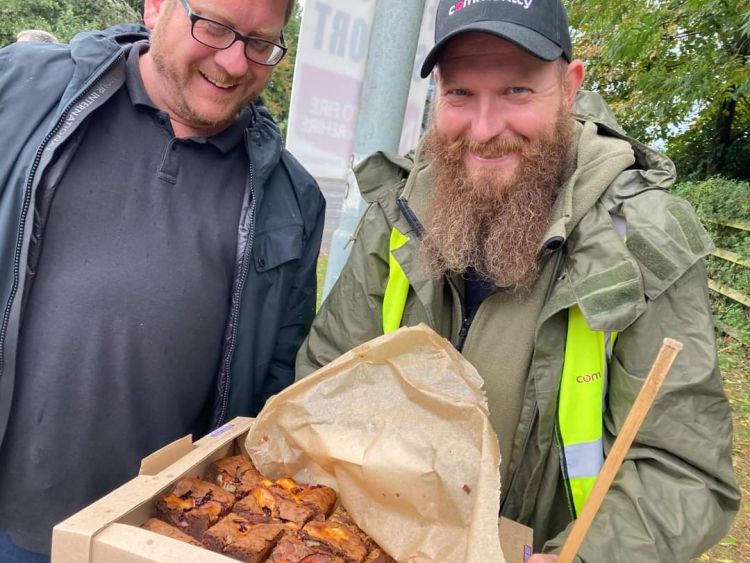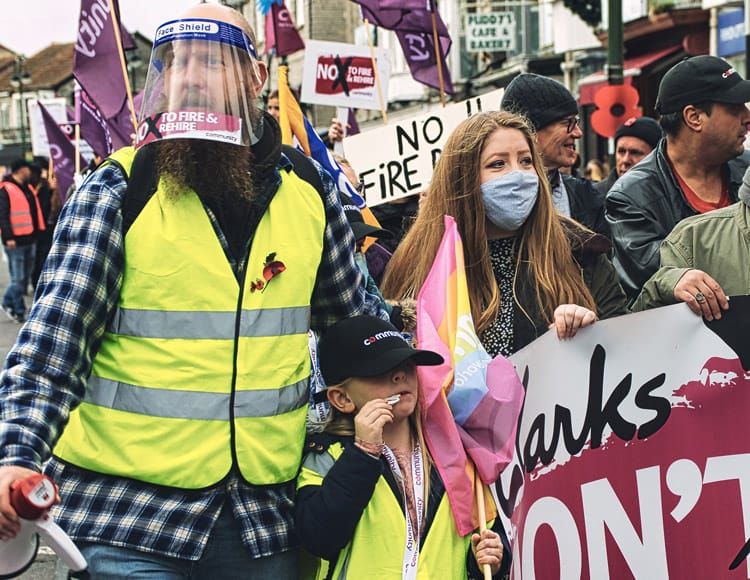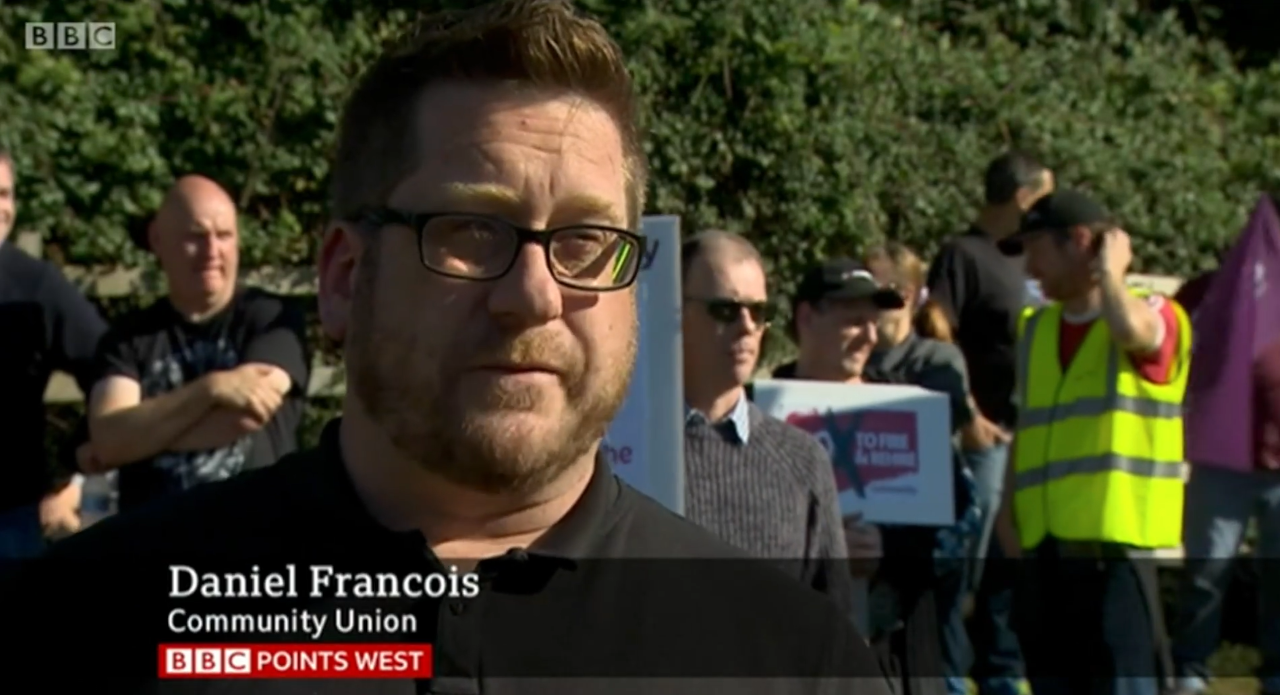After 18 years at Clarks, union rep Trevor Stephens led 140 workers out on strike
There’s a lot of history round here. I rent a flat in an old Clarks house and my bathroom is actually an old homework room. The gentlemen used to go and work in Clarks and they’d bring home baskets of work so that in the evenings, when the kids were in bed, their wives could do homework, like stitching on uppers.
We no longer manufacture in the UK, so where we work is basically a logistics hub. The shoes come in and go on shelves upstairs. Orders are picked and the shoes come downstairs via conveyors, and they get sorted out on a great big carousel in the middle of the warehouse. Orders are packed and then shipped. If you order a pair of shoes from Clarks.co.uk, we're the ones who pick the shoes from the shelves, pack them and send them off to your house.
I wear a few hats at work. I’m a warehouse operative, which means I do manual handling as well as training for new staff. I’m a health and safety rep and in December 2020, I became a day shift rep. In March 2021 I was in pay negotiations and by October 2021 I was on strike. So it’s really been quite an eye opener.
We obviously weren’t happy when we were told our terms and conditions were being slashed. Clarks said if we couldn’t agree to the new T&Cs, they would ‘disengage to reengage’. We called this fire and rehire. If it looks like a duck, walks like a duck and quacks like a duck, it’s a duck.
Some of the guys have been here over 40 years. So it felt like a smack in the teeth. It was insulting and it was painful.
If we went down to the minimum wage, I’d struggle to afford my flat – and I wouldn’t be able to see my kids. I need to have a two-bedroom place so that they can come and stay. So for me, the real risk was losing my flat and not being able to see my children.
We made sure that everything leading up to the strike was above board. We did an unofficial ballot to get a feeling about whether or not people wanted to take industrial action. Then we did an official ballot which came back around 96% positive for industrial action with a strike – one of the highest rates we’d ever had.
We went out on Monday 4th October. I was there at 5am setting up the picket, hanging up the banners, making sure everything was ready for when for my members arrived at 6am. I was very nervous because it was the first strike Clarks had had in over 130 years. To get to that point was very upsetting because a strike is always damaging to both sides. When you go back in, there’s an awful lot that you have to repair.
Within half of an hour of us setting up on that first morning, the police came down. Apparently we were blocking the road and the pavement. But the only thing blocking the road was the police car. As the police talked to us, a lady came running along with her dogs and everyone took a step back off the pavement to let her by. She wished us a good morning and carried on running. The officer joked, ‘Yeah, I can’t see you’re going to be trouble.’ We asked if the call was anonymous. It was. What a surprise…
We wanted to run the line properly – politely and officially. We didn’t want any hassle in any shape or form. I took pride in the way we ran that line. I knew that I was allowed six people on my official picket. Everyone else – our ‘well-wishers’ – stood on the other side of road to provide support. We chose to stand on the line from 6am to 6pm, with the day shift doing 6-12 and the twilight shift taking over from 12-6. Daniel and Adrian from Community came every day to show their support.

We had such an outpouring of support from local people. They were tooting their horns, dropping off food parcels, stopping and giving us money so that we could go and buy hot drinks from across the road. Local cafes dropped off cakes. A brilliant local band called Seize the Day even wrote a song for us called No to Fire and Rehire. I was gobsmacked by that.
Community covering 100% of our basic wages took a hell of a lot of stress off everyone. When the strike went on longer than we anticipated, Community told us they’d have to drop our wages down to 75%. We had a quick chat on the line and then the higher paid workers went back to Community and said, ‘We’ve got some lower paid guys on the minimum wage. Is there any way we can keep them at 100% so that they can afford to stay out with us?” And the union agreed. I think that’s what embodies Community– the guys thinking about their colleagues like that.
Even though Community was paying our basic wages, we had people who were struggling to buy food because they weren’t doing overtime, which is a big part of the pay people are used to. So we had a whip round and started doing breakfasts in the morning so that everyone could have a coffee and something to eat. One of the guys brought in a little gas burner and we all chipped in for gas, and we did bacon and sausage rolls. That created a real sense of community on the picket.
I became the face of the strike at one point. Talking to the media was totally new to me – and standing in front of a camera is not exactly my forte! But my story never wavered; I stuck to the facts. I was asked if we wanted people to boycott Clarks. I said no – we wanted people to keep buying shoes because we wanted a job when we got back in there.
I didn’t once think we were going to fail. I couldn’t even entertain that in any way, shape or form. I had to be 100% positive.
I had to be strong for my members. If they saw me wavering or faltering, that would have changed everything.

Six weeks into the strike, around 400 plus people joined us for a march. Trade unionists from all over the country came to give us support. It was absolutely amazing. We marched through town with banners, whistles, clappers and drums. Local people came out of shops and houses to clap us. We ended up in a big park where we had some speeches.
When my children marched down the high street with me, I couldn’t have been prouder. I’d told my daughter what was happening – that daddy’s work wanted to give me less money for the same job. She thought about it for a second, looked at me and said, ‘But Daddy, that’s not fair.’ If a six-year-old could work that out, it’s amazing that the managers couldn’t.
It was the media coverage of the march that led to ACAS finally getting involved. A gentleman called Mike met us all off site – us in one room and management in another – and we were able to tell him anything we wanted to. He was completely impartial.
After three days of talks, we got an improved offer. It wasn’t perfect. We still lost things (and we weren’t expecting inflation to go the way it has). We then had to go back to the members and have a vote on the new offer, which was nerve wracking. It went through by a majority and after eight weeks on strike, we were back in work the following week.
My advice for others would be to keep a positive mindset. You’ve stepped out there for a reason and you’ve got the backing of people you’ve stepped out with.
Show the management that you’re doing it not because you’re trying to be difficult, but because you’ve got to make the point. Just keep going.
Daniel Francois from the Community union has been working with members at Clarks since 2017. He gives us his take on the strike.
"... they underestimated Community and our fantastic reps like Trevor"
Dan and his colleagues appeared on BBC News
In April 2021, Clarks tried to start a process called ‘harmonisation’. This was about replacing about 8000 different contracts with one contract for everybody. That creates problems: some people are going to lose and some people are going to gain.
The new contract bought everything down to statutory minimum levels. There was a reduction in hourly pay, removal of paid breaks, reduction in holiday, reduction in sick pay and reduction in redundancy entitlement. The general approach was, ‘That’s the statutory minimum, so why shouldn’t we do it?’
Organising a strike is a combined effort. There’s a lot of admin involved: we had to make sure our membership database was up to date so that we were only balloting the correct population. We had to contact local authorities and apply for paperwork. Our comms and marketing team designed banners and car stickers while our policy and research team went to Westminster and talked to MPs.
Technically, you can only have six people on an official picket line. So ours was on one side of a mini roundabout and across the road were about 100 other people. It was a fine line and, to be fair, Clarks were quite gracious about it.
My colleague Adrian and I took it in turns to be there every day. He’s from Derby and I’m from Cheltenham so we’re not local, but one of us was there at 6am every morning to show our support. Before that I’d done three weeks of back-to-back consultations from 7.30am to 5pm five days a week, so all in all it was a very busy period.
I think some managers thought we’d be out of a couple of weeks and then we’d back down because we couldn’t afford to stay out. But they underestimated Community and our fantastic reps like Trevor. We may not be the biggest union in the world, but we’ve certainly got the funding and the support behind us. And I really think we created something in Street. It was almost as though our combined solidarity on the picket line created something in the local community as well.”


